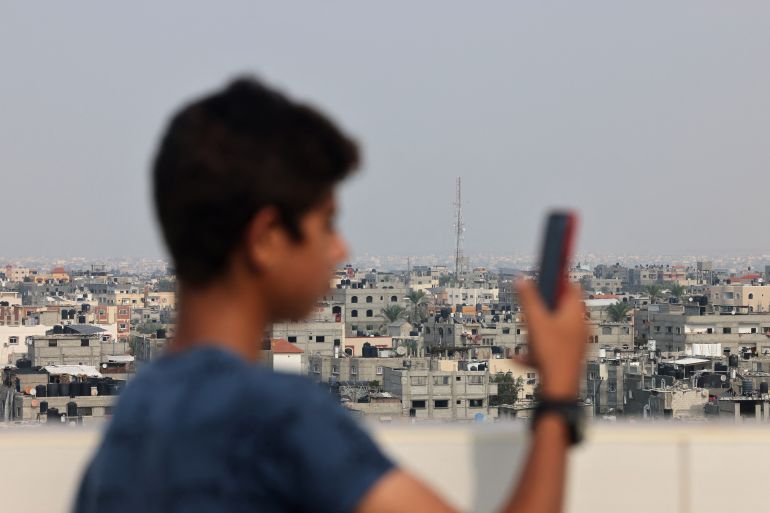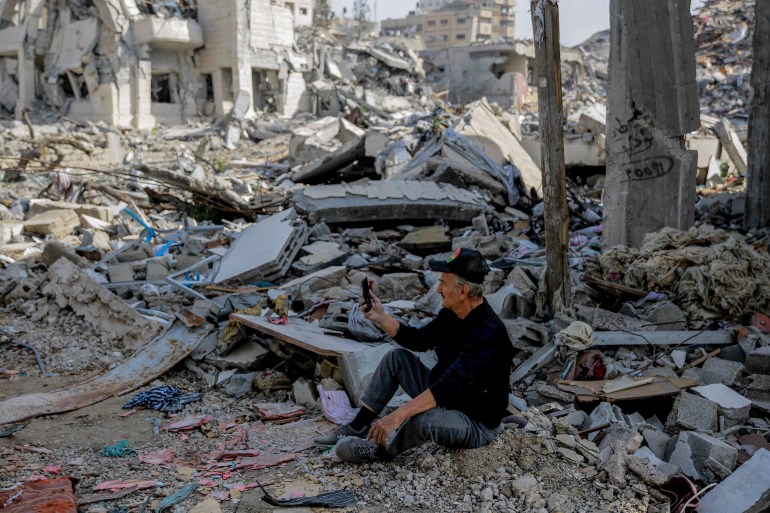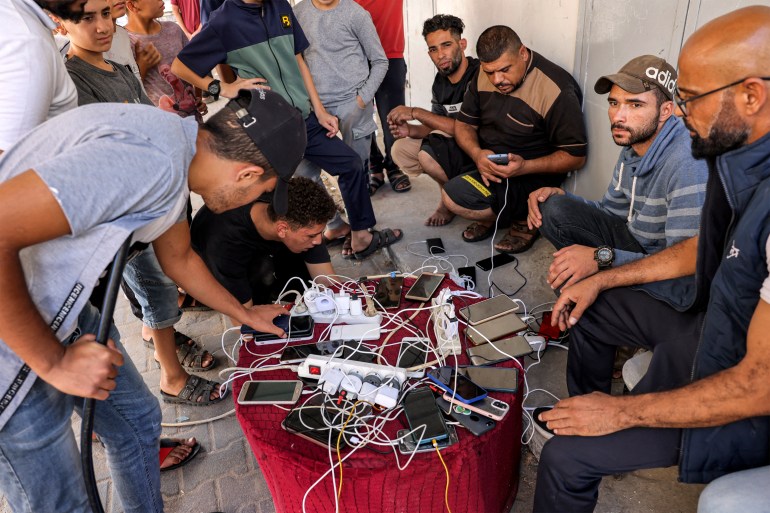‘We are dying here’: Terror in Gaza amid Israeli communications blackouts
A writer stuck inside Gaza tells Al Jazeera of the terror and frustration of life under internet shutdown.

Eman al-Astal’s overseas colleagues and friends could imagine only two scenarios when they lost contact with her. Neither offered much comfort.
The first was that the freelance writer inside Gaza had lost communications because of a technical glitch or communications blackout, common enough occurrences under the Israeli missile barrage that has pounded the Gaza Strip for the past two months. The other was far darker: that their friend and colleague had fallen victim to one of those strikes.
Keep reading
list of 4 itemsICJ to hear Israel response to S Africa urgent appeal for Rafah attack halt
Republicans in US House pass bill pushing Biden to send weapons to Israel
‘Gaza largely wiped off the map’: Israel reinforces Rafah ground invasion
“I was constantly becoming [just as] anxious and as worried about my friends and colleagues as they were about me,” Eman said. “Not because of anything dangerous on their side but because I know what it is like to do everything you can to check in on your loved ones and still feel helpless.
“When we in Gaza disappear, we disappear. Life here is so unpredictable that we could sink into a total blackout at any moment and the world will know nothing about it.”
Shortly after Eman’s phone first failed, news spread that telecommunications and the internet had been severed across Gaza. While understanding why Eman might be digitally absent, that raised new problems.
“Everyone who had contact with me was asking friends of mine abroad, checking on social media and reaching out to relatives outside,” Eman said. “I’m not so precious to the world, but I’ve known that I mean something to my people and those around me.”
The 22-year-old English literature student who freelances as a part-time content writer from Gaza, explained how her colleagues had exhausted every possible means to reach her, desperate for any news.
Throughout the blackout, meanwhile, Eman, like hundreds of thousands of other people in Gaza, was left in the dark.

‘Like being left on another planet’
A few days after Israel declared war on Gaza, an air strike on Rimal took out the telecommunications company Etisalat’s network in central Gaza, causing a significant internet outage across the city and leaving Eman and many of the strip’s inhabitants with only what data remained on their phones.
As the war raged on, the communications blackout became a source of intense anxiety for Eman and the hundreds and thousands of people like her across the strip as well as their families, friends and colleagues scattered across the globe.
During the day, Eman would wander around her neighbourhood, hoping that her phone’s signal would reappear, only to be disappointed.
“No matter what you do, you still cannot change anything,” Eman said. “It was like being left on another planet. There was nothing I could actually do.”
She scrolled endlessly through her group chats, searching for any advice on what to do. After about three days, cellular service was restored, allowing Eman to reconnect with the outside world and update her friends and professional network that she was “alive!”
“Phone stores aren’t working during wartime, so I had friends abroad buy prepaid credit. But even then, it wasn’t as helpful as I had thought,” she said, describing how she struggled to access WhatsApp and other messaging services.
Eman said she believes Israel is deliberately targeting telecommunications towers and companies in Gaza, hoping to silence the news emerging from the besieged enclave.

Recently, eSIMs have emerged as one potential source of hope, allowing residents a new way to connect to the internet without a physical SIM card.
For Eman and her work colleagues, eSIMs seemed to promise much but delivered only limited communications.
“It was only capable of transferring text data, and it would take a long time to load,” she said.
Later, she was advised that to maintain a strong signal and stay online, she should change her location, ideally high up for a better signal but impossible in the face of ongoing Israeli air strikes.
Although limited and providing only intermittent communication, eSIMs are at least something. “Every one of my friends and colleagues abroad is concerned every time I’m forced offline. It’s a mutual fear that I may never speak to them again,” Eman said.
For her, knowing the worry her online absence causes her friends and family is almost worse than the impact it has on her.
Like thousands of others with remote jobs and commitments outside Gaza, Eman faces the possibility of having to bid farewell to friends, family, colleagues and a source of income that she has built over the years.
“It’s not feelings of despair and anger at what continues to happen to us before the world’s eyes but the fact that we are frustrated with nothing we can do about it,” Eman reflected. “We are dying, being isolated, abandoned, and we are running out of solutions, I am afraid.”